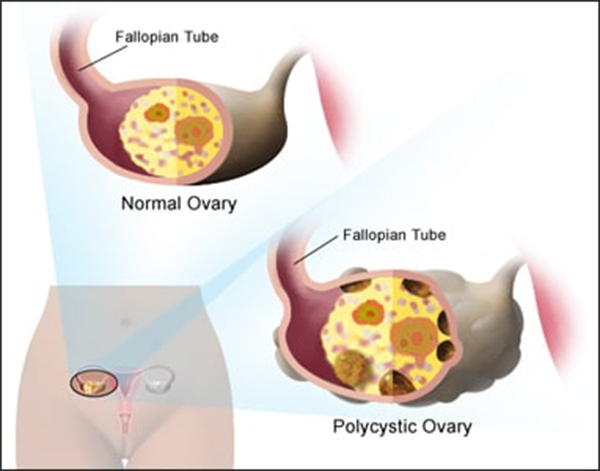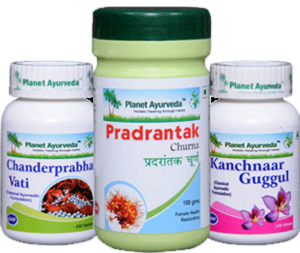How to Treat PCOD with Ayurvedic Herbs and Yoga Asanas?
The treatment with Ayurvedic herbs and yoga asanas (postures) is a natural treatment and natural treatment for any disease is always considered as the best and safe treatment. There are also available various Yoga asanas and Ayurvedic herbs for the treatment of PCOD (Polycystic ovarian disease).
PCOD (Polycystic Ovarian Disease)
The PCOD (Polycystic ovarian disease) is a hormonal disorder which affects the endocrine system of the female reproductive system. In this condition, the size of ovary expands and formation of one or multiple cysts occurs in ovaries. This leads to the abnormal menstrual cycles, cardiac problems and it is the main cause of infertility.

Causes of PCOD
There is no exact cause of PCOD but some factors like environmental factors and genetics are responsible for its occurrence.
It includes
- Hereditary
- Poor lifestyle
- Overproduction of androgen
- Insulin resistance
- Sleep apnoea
- Obesity
- Cardiovascular diseases

(Reference: Charka Samhita, Chikitsa sthana / Chapter no. 30 / Shloka no. 8)
This shloka explains – Due to improper diet and lifestyle, all the three doshas (Vata, Pitta, and Kapha) in the body gets vitiated and further, they get accumulated in the reproductive system where it grows multiple cysts in the ovary and the condition is called as polycystic ovary disease.
Symptoms of PCOD
It includes
- Acne and pimples sprout
- Infertility
- Thinning of hair
- Abnormal hair growth on face and body
- Pelvic pain
- Abnormal menstruation
- Weight gain
Some Complications of PCOD
- Cardiac complications
- Endometrial cancer
- Gestational diabetes
- Hypertension
- Infertility
- Metabolic syndrome
- Miscarriage
Ayurvedic Herbs for PCOD
The use of Ayurvedic herbs is a natural way for the treatment of PCOD (Polycystic Ovarian Disease). Planet Ayurveda provides effective natural remedies for PCOD such as Anti-Ovarian Cyst Pack. These medicines are 100 percent pure and vegetarian, free from preservatives, chemicals, and additives. These are free from any side effects.
The products offered by Planet Ayurveda are Chanderprabha Vati, Kanchnaar Guggul, and Pradrantak Churna.
Products Description
1. Chanderprapha Vati
This formulation of Planet Ayurveda consists of various ingredients such as Guggul (Commiphora mukul), Sharkara (Sugar), Shilajit (Asphaltum), Kapoor (Cinnamomum camphora), Vacha (Acorus calamus), Mustak (Cyprus rotundus), Haridra (Curcuma longa), Chavya (Piper chaba), vidanga (Embelia ribes), Amalki (Emblica officinalis), Shunthi (Zingiber officinalis), Sarjikashaar (Sodium carbonate), Maricha (Piper nigrum), Pippali (Piper longum), Yavkshaar (Potassium carbonate), Saindhavlavan (Rock salt), Survarchallavan (Sodium sulphate), Vidalavan (Black salt), Danti (Baliospermum montanum), Guduchi (Tinospora cardifolia), Dalchini (Cinnamomum zeylanica), Ela (Elettaria cardamomum), and Tejpatta (Cinnamomum tamala). According to the Ayurveda, the main cause of PCOD’ is vitiated Kapha dosha and Chandraprabha vati is the best herbal formulation to balance the vitiated Kapha dosha in the body. It means Chandraprabha vati is an effective herbal remedy for PCOD. It is also used in diabetes, cancers, and obesity, and general weakness in conditions related to the urinary system.
Dosage: Two tablets, two times a day with water after meals.
2. Kanchnaar Guggul
The main ingredients of Kachnar Guggul are Kachnar Bark (Bauhinia variega), Amalaki (Emblicaofficinalis), Haritaki (Terminalia chebula), Bibhitaki (Terminaliabellerica), Ginger (Zingiber officinale), Black Pepper (Piper nigrum), Pippali (Piperlonguum), Varuna (Crataeva religiosa). This herbal formulation helps to maintain the balance of tridosha (Vata, Pitta, Kapha) in the body. It also shows effective results for cysts and fibroids, and also used in the treatment of thyroid. Kachnaar Guggul helps to decrease cholesterol level in the body. This herbal formulation also hinders the growth of both malignant and benign tumors.
Dosage: Two tablets, three times daily with plain water after meals.
3. Pradrantak Churna
This powder formulation of Planet Ayurveda is prepared by using several herbs such as Lodhra (Symplocus racemosa), Ashok (Saraca indica), Udumbur (Ficus glomerata), Arjuna (Terminalia arjuna). Pradrantak churna promotes female health and helps to cure many diseases like ovarian cysts, uterine fibroids, and premenstrual syndrome. Ashok (Saraca indica) in this churna helps to balance the hormone level.
Dosage: One teaspoonful, two times a day with water after meals.
Yoga Asanas for PCOD
There are various yoga asanas for the treatment of PCOD (Polycystic Ovarian Disease). It is also a natural way to treat PCOD and many other diseases. The yoga asanas recommended, provides various benefits for PCOD treatment. These poses massages the internal organs, improve blood circulation, improves digestion and create gastrointestinal balance.
Some Poses Recommended for PCOD Treatment are
- Bharadvajasana (Bharadvaja’s Twist)
- Dhanurasana (Bow pose)
- Bhujangasana (Cobra pose)
- Padmasana (Lotus Pose)
- Naukasana (Boat Pose)
- Badhakonasana (Butterfly pose)
1. Bharadvajasana (Bharadvaja’s Twist)
This Yoga asana is very effective in the treatment of PCOD. This alleviates the discomfort in the ovaries. Regular practice of this asana helps to reduce blood pressure, calms the nervous system, and relieves stress and anxiety.
2. Supta Badhakonasana (Reclining Butterfly Pose)
This Yoga asana helps to treat PCOD as it reduces stress by relaxing the pelvic region. It also reduces tension in the lower back and provides relief from menstrual pain.
3. Dhanurasana (Bow Pose)
This pose stimulates the functions of the reproductive organs, provides relief from menstrual discomfort, instead promotes healthy menstrual cycles. It also helps to stimulate abdominal organs, opens up your chest, and relieves constipation, etc.
4. Bhujangasana (Cobra Pose)
This asana is beneficial for the patient with PCOD. It provides relief from the pain and discomfort caused during menstruation. It also promotes digestion, blood circulation, and heart health.
5. Padmasana (Lotus Pose)
Padmasana opens up the pelvic region and also helps to elevate the hormonal imbalance, which is important for PCOS treatment. It provides relief from menstrual discomfort, controls blood pressure, fights insomnia, eases childbirth, strengthens the joints, and relaxes the mind.
6. Naukasana (Boat Pose)
This is one of the useful Yoga asanas for the treatment of PCOD. It is also beneficial for people who want to lose weight. It also enhances the blood flow to the reproductive organs and functions of the ovaries become normal.
7. Badhakonasana (Butterfly Pose)
This asana is beneficial for the patient with PCOD as it stretches the pelvic region and provides relaxation to reduce stress and relieve the menstrual discomfort.
Some other yoga asanas which are effective in the treatment of PCOD are
Balasana (Child’s Pose), Marjaryasana and Bitilasana (Cat and Cow Pose), Prasarita Padottanasana (Wide-legged forward bend), Shavasana (Corpse Pose), and Kapalbhati (Breathing exercise).






